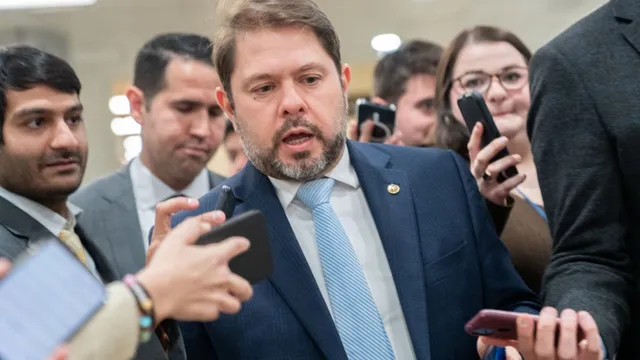
Senator Brian Schatz expands hold on Trump nominees to 300 positions
2025-04-09 00:00- Sen. Brian Schatz has placed a procedural hold on over 300 nominees from Trump's administration.
- This includes nominations across various agencies as a response to perceived lawlessness.
- Schatz's actions demonstrate increased resistance among Senate Democrats against Trump's second-term agenda.
Express your sentiment!
Insights
In the United States, Senator Brian Schatz, a Democrat from Hawaii, has taken significant action against President Donald Trump’s administration by expanding his hold on government nominees to over 300 positions. This move, confirmed by his office, applies not only to State Department nominees but also to individuals across various federal agencies. Schatz's holds include nominations such as the former GOP Rep. Anthony D’Esposito for Labor Department inspector general and Scott Kupor for leading the Office of Personnel Management. The senator expressed his concerns regarding the actions of the Trump administration, referring to their approach as one of 'lawlessness' and stating that they are 'intentionally destroying the economy.' Moreover, he indicated that he would not cooperate unless the administration provides explanations for their actions and begins complying with the law. Schatz's hold reflects a broader sentiment among a small but growing number of Senate Democrats who aim to strategically obstruct Trump’s political appointments in response to concerns about the administration’s disregard for federal laws and judicial orders. Alongside Schatz, senators like Adam Schiff and Ruben Gallego have also blocked several Trump administration nominees, citing similar reasons. These actions symbolize a call to attention regarding the potential impacts of the Trump administration's policies, especially in relation to employment within government departments like the Veterans Affairs (VA), where significant cuts were suggested. Ultimately, Schatz’s decision to hold these nominations showcases a legislative strategy aimed at slowing down the confirmation process for Trump allies, signaling to the Senate and the broader public that Democratic senators are willing to use their power for resistance against perceived government mismanagement and illegality.
Contexts
The Trump administration had a significant and lasting impact on government appointments, characterized by a strategic approach to filling key positions across various federal agencies and departments. This approach emphasized the selection of individuals who aligned closely with his administration's priorities, particularly in areas such as deregulation, immigration, and conservative judicial appointments. The process was marked by a departure from traditional nomination practices, prioritizing loyalty and ideological alignment over conventional qualifications or bipartisan support. This shift has led to various critiques regarding the effectiveness and qualifications of appointed officials, raising concerns about the long-term implications for governance and institutional integrity. One of the most notable aspects of the Trump administration's approach to government appointments was its emphasis on swift and aggressive appointments, particularly to the federal judiciary. The administration successfully nominated and confirmed a significant number of judges, including three Supreme Court justices, which has had a profound effect on the judiciary's ideological balance. This legacy of conservative judicial appointments has been one of the defining achievements of the Trump presidency, as these judges are expected to shape legal interpretations on crucial issues for decades. This commitment to reshaping the judiciary was also evident in the appointment of judges to federal courts, which has implications for various areas of law, including healthcare, environmental regulation, and civil rights. In addition to judicial appointments, the Trump administration also had a considerable influence on the leadership of various government agencies. Appointees, particularly in agencies such as the Environmental Protection Agency (EPA) and the Department of Education, often reflected a deregulatory agenda that was at odds with the missions of these agencies. This approach sparked significant controversy and public backlash, particularly from those who argued that the appointments undermined the capacity of these agencies to address critical issues such as climate change, public health, and education equity. Critics pointed to instances where appointed officials appeared to prioritize partisan interests over public service, thereby affecting the operational effectiveness and credibility of these institutions. Overall, the impact of the Trump administration on government appointments is multifaceted, illustrating a strategic prioritization of loyalty and ideological alignment. This approach has realigned the executive branch in ways that could have lasting consequences for governance in the United States. As the nation moves forward, the ramifications of these appointments will continue to unfold, highlighting the tensions between partisan objectives and the broader responsibilities of government to serve the public interest. The legacy of these appointments will remain a topic of discussion and analysis as the political landscape evolves.